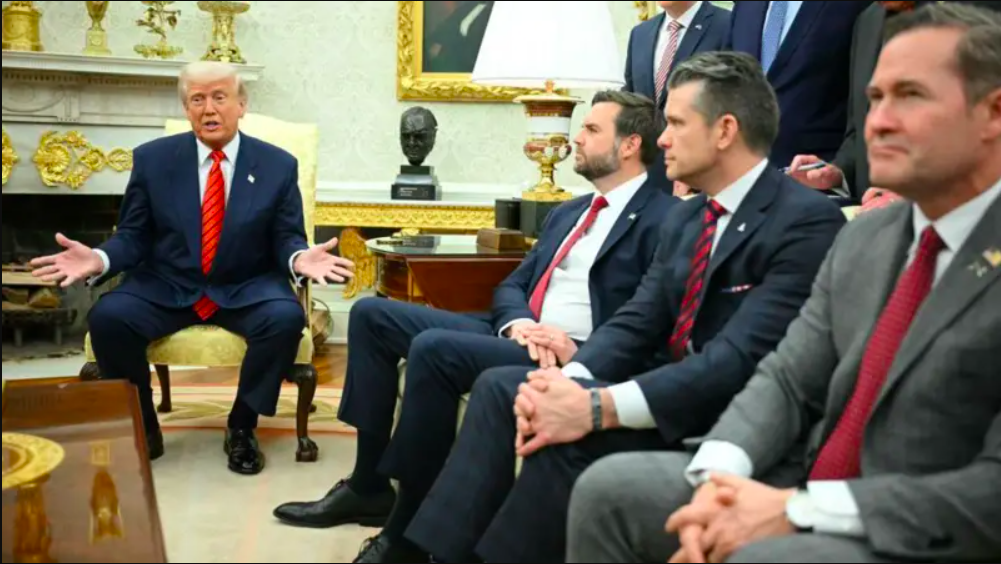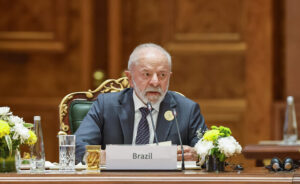
Published 26/03/2025 15:28 | Edited 26/03/2025 15:30
The recent exhibition of the visceral disregard of the main US security and defense authorities for Europe’s allies shocked diplomacy from the Atlantic side. The incident occurred after an unexpected leakage: a chat in the signal application between central Trump government figures, including Vice President JD Vance and Secretary of Defense Pete Hegseth, came public due to an impressive and unusual security error. The editor-in-chief of the magazine The AtlanticJeffrey Goldberg, was mistakenly added to the group and made the conversation sensitive about national public defense.
The discussion revolved around the planned attacks against the Houthis rebels in Yemen to unlock trade routes on the Suez channel. In the leaked dialogue, Vance would have disagreed with Trump by questioning the relevance of the operation for the US, noting that only 3% of his commercial traffic depends on the channel, in contrast to 40% of Europe. Hegseth, in turn, expressed irritation with European “opportunism”, while other members of the government discussed ways to ensure that Europeans paid for the costs of US military intervention. The European reaction was “disgust,” according to an EU source, exacerbating mutual distrust.
“Why save Europe?” Said Vance. Pete Hegseth, Secretary of Defense, echoed: “It’s pathetic,” referring to European dependence. Vance’s criticism of European values (such as abortion and freedom of expression) and Trump’s sympathy for Putin corrode the narrative of “shared values” and reveal a cultural abyss. For Europe, align with an ally who flirts with authoritarianism undermines his credibility as an advocate of liberal democracy.
For Trump, Europe represents progressive values contrary to its conservative nationalism. This split makes it difficult to cooperate on topics such as climate change and human rights, expanding the transatlantic pit.
Resentments in the USA-Europe relationship: From the Cold War to the “America First”
The US-European Alliance, built on the rubble of World War II, has always had cracks. While Western Europe prioritized the post-war Welfare State, the US remained high military spending (3.7% of GDP) and 100,000 soldiers on European soil. Since that post-1945 period, the partnership between the United States and Europe has been a pillar of the international order, supported by NATO and economic integration. The US guaranteed military security, while Europe depended on this “umbrella” to focus on social welfare. However, under the Trump administration, the relationship became tense, with recurring criticism of European military spending and divergences on values.
The revelation intensified a climate of distrust that was already getting worse. President Donald Trump and his allies see Europe as a “profiteer”, supported by US military power without contributing proportionally to his own defense. “Europeans live at our expense,” summarized Hegseth at the leak. The reluctance of European countries to reach 2% of GDP in military spending, stipulated by NATO, is a constant point of friction. In contrast, Washington allocates 3.7% of his GDP to defense.
Europe, in turn, faces an existential dilemma. With Russia’s renewed aggressiveness and growing global instability, the dependence on American protection becomes a vulnerability. The possibility of gradual US abandonment drives debates on greater European military autonomy, including the strengthening of cooperation in defense and security within the European Union.
Advantages for Russia and China
Without the US, Europe would take years to rebuild military capabilities, leaving it vulnerable to hybrid attacks and eventual Russian pressure.
Europe still depends on the US for intelligence, air defense and nuclear dissuasion. Despite discourses on strategic autonomy (such as the EU defense plan), the lack of investment and coordination persists. The fear is that Trump’s disinterest in NATO and his admiration for Putin Minem the dissuasion against Moscow. “If the US withdraws, Europe will be unprotected,” warns an analyst from Le Figaro.
A break would force the EU to look for alternatives – such as partnerships with China or even cautious rapprochement with Russia – but that would require time and resources that currently do not exist.
China’s rise requires transatlantic cooperation in technology (5G, AI) and commerce. A break would allow Beijing to exploit divisions, offering investments to Europe or expanding strategic partnerships. The recent crisis in the Seder Sea illustrates how the lack of western unit benefits opponents.
Strategic vulnerabilities for the US
When and where to use the American military force is one of the most sensitive and risk -filled presidential actions. If the enemy has prior access to this type of information, it can put lives – and national foreign policy goals – to lose.
In addition, the fact that these conversations occurred outside the planned government channels can configure a violation of the legislation, which defines rules for dealing with confidential information. For this reason, Democrat MP Chris Deluzio stated that the House Armed Services Committee, of which he is part, should conduct an investigation and an audience about what happened as soon as possible.
On the other hand, the very possibility of rupture between allies prints geopolitical risks to the US. Europe is crucial to containing Russia and counterbalance to China. A rupture would weaken US ability to design power in crises such as Ukraine war or disputes in Indo-Pacific, with loss of geopolitical leverage.
Retaliatory tariffs, such as Trump’s threatened against European beverages, may undermine key sectors (agribusiness, technology) due to the economic interdependence of this alliance. The EU is the largest commercial partner in the US, with a flow of $ 1.3 trillion per year. Reciprocal tariffs could cost billions and destabilize global chains leading to a profound economic crisis. In the signal, Stephen Miller suggested “economic gains” as counterpart by military operations, indicating a commodification of the alliance.
The visit of Maros Sefcovic and Ursula von der Leyen to Washington this week seeks to contain new rates, but distrust is mutual. “Europe needs to choose: pay or protect itself alone,” Trump’s advisor told Franceinfo.
NATO and UN depend on transatlantic cohesion which could imply in a weakening of multilateral institutions. A divorce would encourage rival powers such as Russia and China to expand its influence on spaces such as the Balkans and the Southern Sea of China.
A global realignment?
The growing hostility between the two sides of the Atlantic raises questions about the future of the global order. While the US redirects its attention to competition with China, Europe is forced to reconsider its alliances. The possibility of a more independent Franco-German axis and a strengthening of bonds with emerging powers, such as Brazil and India, gains strength.
At the same time, Trump’s affinity with Vladimir Putin worries Europeans, who see Russia as an immediate threat to their safety. Washington’s insistence on which Europeans assume a greater financial and military role, added to the ideological criticisms of figures such as Vance – which condemns European values such as the defense of reproductive rights and civil freedoms – signals a removal that can have deep consequences.
Inflection
The leakage of chat in the signal is a symbol of a latent crisis that can redefine the dynamics of international relations. If Europe decides to reinforce its strategic independence, the US may lose a traditional and influential ally. If, on the other hand, Europeans give in to US pressures, their sovereignty and decision ability to be even more committed. In an increasingly polarized world, the erosion of the transatlantic alliance can redesign the geopolitical board in unpredictable ways.
An alliance that faces its greatest test since the Cold War. While the US question the cost of sustaining Europe, Europeans fear hostage to a volatile ally. Divorce is a luxury that neither side can pay. The dialogue is urgent: sanctions and bellicose rhetoric will only deepen the wounds. The alternative-a rupture-not only would weaken global security based on US imperialism, but would accelerate the transition to a multipolar world, where US and Europe would lose influence to strategic rivals.
As the European diplomat summed up: “It’s horrible to see with all the letters. But it’s not surprising.” The alliance will survive only if both recognize that without cooperation everyone lose.
Source: vermelho.org.br

